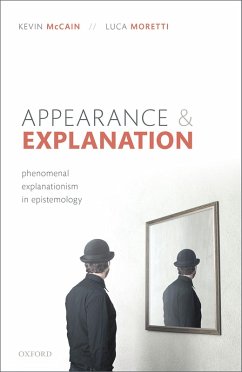
Optimality Justifications (eBook, PDF)
New Foundations for Epistemology
Versandkostenfrei!
Sofort per Download lieferbar
55,95 €
inkl. MwSt.
Weitere Ausgaben:

PAYBACK Punkte
28 °P sammeln!
The leading idea of epistemology in the Enlightenment tradition was foundation-theoretic: to reach knowledge, we must not legitimize our beliefs by external authorities, but instead justify them by rational arguments. Recently, the foundation-theoretic ideal of justification has come under attack, the chief criticism being that universal standards of justification are illusory because the problem of a regress of justification is unsolvable. Alternatives to foundation theory (coherentism, externalism, or dogmatism) have been developed that give up central claims of Enlightenment epistemology su...
The leading idea of epistemology in the Enlightenment tradition was foundation-theoretic: to reach knowledge, we must not legitimize our beliefs by external authorities, but instead justify them by rational arguments. Recently, the foundation-theoretic ideal of justification has come under attack, the chief criticism being that universal standards of justification are illusory because the problem of a regress of justification is unsolvable. Alternatives to foundation theory (coherentism, externalism, or dogmatism) have been developed that give up central claims of Enlightenment epistemology such as empirical support, cognitive accessibility, or rational justifiability. Optimality Justifications develops a new account of foundation-theoretic epistemology based on the method of optimality justifications. Optimality justifications offer a solution to the regress problem. Rather than striving for a priori demonstrations of reliability, which are impossible, they show that certain epistemic methods are optimal with regard to all accessible alternatives, which is more modestly but provably possible. In particular, optimality justifications can achieve a non-circular justification of deductive, inductive, and abductive reasoning. This volume pursues two goals: a general renewal of foundation-theoretic epistemology based on the account of optimality justifications, and the advancement of methods of optimality justification in important domains of epistemology and the philosophy of science, logic, and cognition. Connected with these goals is the aspiration to develop new ideas for mainstream epistemology, as well as for formal epistemology, philosophy of science, and cognitive science, which are intended to attract researchers, students, and all other readers interested in these fields.
Dieser Download kann aus rechtlichen Gründen nur mit Rechnungsadresse in A, B, BG, CY, CZ, D, DK, EW, E, FIN, F, GR, HR, H, IRL, I, LT, L, LR, M, NL, PL, P, R, S, SLO, SK ausgeliefert werden.













